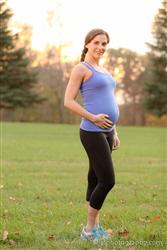By Emily Saunders, Personal Trainer, Nutrition Coach and Group Fitness Trainer
As part of living a healthy lifestyle, we must not only be good role models for our children but also help them get a good start. The health and well-being of our children starts very early on and decisions that we make during pregnancy not only affect their growth and development but also alter their risk of developing chronic diseases as adults.
The old “eat for two” and “avoid strenuous exercise” advice encouraged pregnant women to sit around and see how much weight they could pack on during the 9 months leading up to birth. However, we now know that a healthy diet and exercise during pregnancy is essential. Study after study has shown that remaining fit and eating healthy during pregnancy results in better outcomes for both babies and their mothers for years to come! Some benefits include easier and shorter labor and birth, fewer c-sections, quicker recovery postpartum, and fewer pregnancy complications like preeclampsia and gestational diabetes. As adults, these babies also end up having higher IQ scores and are less likely to develop chronic diseases like obesity and diabetes.
Of course , some exercise must be altered to accommodate the demands of pregnancy on the body. A few of the most common restrictions are listed below.
1. Avoid significant jumping/plyometrics: The hormone relaxin softens the ligaments allowing the bones to expand during pregnancy. Bouncing and jumping can cause increased risk of injury.
2. Stay off your back after the 4th month: When lying on your back the vena cava can become compressed causing reduced blood flow and oxygen to the fetus. Many times women also becoming dizzy and uncomfortable on their backs as well but not always.
3. Do not push your body to the extreme: It is important to listen to your body now more than ever before. If you were working out six days per week prior to pregnancy you will be able to exercise longer and more intensely than someone who did not, however you have to do it within reason. Be sure to pay attention to the way you feel, your level of exertion and breathlessness, and your core body temperature. Rest or stop if you find it difficult to catch your breath or feel dizzy or overheated. Pregnant women carry almost twice their normal blood volume which can cause breathlessness and dizziness much quicker than normal.
4. Avoid exercises that could result in abdominal trauma: These include contact sports, horseback riding, outdoor biking, downhill skiing and most water activities. Better safe than sorry!
This short list leaves the field of safe exercises wide open! Pregnant women should discuss their personal situation with their doctor before starting any exercise routine.
Many women struggle from food aversions and nausea during the first trimester and some throughout the entire pregnancy. Such symptoms can make it very difficult to maintain a nutritious balance. The important thing to remember is that pregnancy is more like a marathon not a sprint. The problem lies when women create bad habits early in pregnancy and continue to eat a high sugar and starch diet throughout. A healthy approach is to ask oneself every day- “Can I eat any type of vegetable today?” or “What is the healthiest food that my stomach can handle?” Most pregnant women find that nausea and aversions fade with time and they are able to successfully cross over to a well balanced and nutritious diet. It is important to remain mindful as the palate returns to normal to avoid creating poor habits that linger throughout pregnancy and beyond.
Pregnancy cravings are REAL and should not be ignored. While an occasional indulgence is encouraged, there are many healthier foods that can serve as “buffers” to the initial craving. A few examples:
1. Instead of salted chips choose salted cashews
2. Instead of a Snickers Bar have a few bites of dark chocolate
3. Instead of ice cream make a frothy chocolate protein shake
4. Instead of a Reece’s Cup have a Tablespoon of natural peanut butter with a few chocolate chips.
The food pregnant women eat is the only fuel their bodies have to grow and develop the fetus so a mindful approach to eating is crucial. Through a balanced and well-rounded diet and careful food choices women can experience fewer complications and healthier babies while avoiding excessive weight gain.
Pregnancy is not a disease and it shouldn’t be treated as such- keep moving and keep eating healthy. Your body and your baby will benefit throughout pregnancy and for many years to come!
















